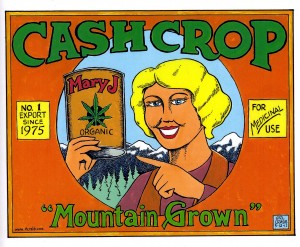 A recent news flash from the Great Northwest brought to light the newest threat to jobs: too much marijuana. When Washington voters approved legalization in the Evergreen State, they really didn’t put too many limits on production. Enthusiastic growers flooded the state, and after a severe shortage during the first season, now they find themselves buried in bud.
A recent news flash from the Great Northwest brought to light the newest threat to jobs: too much marijuana. When Washington voters approved legalization in the Evergreen State, they really didn’t put too many limits on production. Enthusiastic growers flooded the state, and after a severe shortage during the first season, now they find themselves buried in bud.
You’d think that would be a boon to users, but producers are holding firm and trying to smuggle the excess goods out to less enlightened states where scarcity still rules the market. Eventually things will sort themselves out, but there will be many small timers who won’t be able to compete with well-funded plantations.
This may come as a shock to those who have spent the better part of their lives living in the shadows of the cash economy. During periods of recession you could always survive in the pot trade. Like alcohol and food, there are those who can always come up with enough scratch to feed their habit, even if they couldn’t make the rent.
Now, many of those who grew, trimmed or sold may find themselves in the company of artists, musicians, journalists, book publishers, travel agents, loggers, and many other professions in the 21st century. The greatest hope for some will be interference from the government. If the taxes are excessive and regulations for growers too restrictive, the small illegals may yet find customers in the underground market.
As for the rest, welcome to the club. Take comfort in the knowledge that heroin and cocaine are still illegal. Even the old time pure religious Taliban had to backtrack on the poppy farm ban to keep the jihad funded, and the Mexican cartels are not about to start growing papayas. And even with Democrats in charge, it’s not likely that the drug wars will end any time soon. Nature and human weakness abhor a vacuum.

The greatest hope for some will be interference from the government. If the taxes are excessive and regulations for growers too restrictive, the small illegals may yet find customers in the underground market.
I would bet that as consumption becomes more mainstream that smaller growers are going to be squeezed out altogether. As the social opprobrium (such that it is) fades I think growing for personal consumption will increase and squeeze smaller growers from the bottom. Growing for yourself isn’t as labor or equipment intensive as winemaking. At the top end the larger growers will start to buy political influence, lobbying for greater regulation to hobble competition.
I used to think that small weed growers would be like niche wineries. I’m not so sure about that anymore
The mid tier guy is going to have it tough.
On a related note, who says you can’t take it with you… http://www.nbcnews.com/id/28034925/ns/technology_and_science-science/t/worlds-oldest-marijuana-stash-totally-busted/#.VLyhPCxA3Ht
Scientists are unsure if the marijuana was grown for more spiritual or medical purposes, but it’s evident that the man was buried with a lot of it.
Medicinal purposes…….riiiight.
The only way the little guys will remain viable is by selling at local farmer’s market where organic and local products are favored – think microbrews and small vineyards.
No doubt there will be factory farms down in the valley churning out bud for the masses.
Maybe we will have to think about subsidies where people are paid not to grow MJ in order to keep the prices up. What a hoot!
Maybe we should put the oil companies in charge of MJ production. They always seem to be able to squeeze profit out of excess. If that proves successful I’m sure our state legislators will tack on so many additional taxes that it will make it even more fun (which translates as profits) for everybody…except of course, for the consumers.